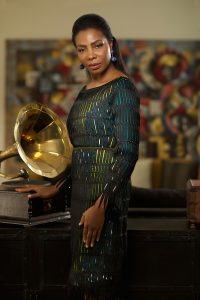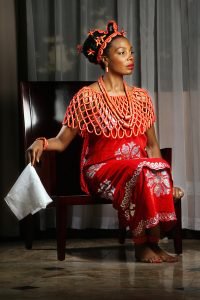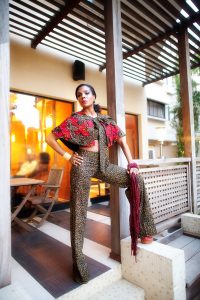Endometriosis: More Than A Silent Inconvenience For Nike Oshinowo And Millions Of Women
By Belinda OtasPublished: September 30, 2014
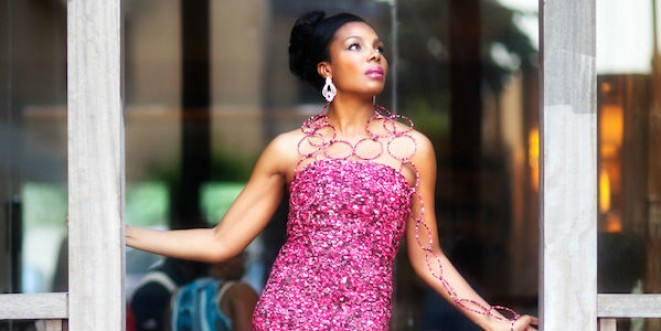
Endometriosis is a medical challenge for which there is no known cause or cure. It is a life-altering, sometimes almost unbearable reality for the millions of women who must live with it. Both Nike Oshinowo and Chinasa Chukwu have lived with endometriosis from a young age, and they have chosen to share their experiences in the hope that other women will not suffer needlessly.
Chinasa’s story
Chinasa Chukwu has a disarming smile, and her Facebook posts tell the story of a young woman living life to the fullest – on her own terms. At 23, Chinasa is also one of thousands of other young women her age living with the pain of endometriosis, a struggle that she documents on her blog, Endoetc.blogspot.com.
Although she cannot remember precisely when her ordeal started, she vividly recalls being confined to her bed because of the pain she experienced during her first menstrual cycle. This pain would continue for 11 years, during which time she would be told repeatedly that there was nothing wrong with her. She had to fight to be taken seriously about the intensity and effects her condition had on her until she was finally diagnosed with endometriosis at 21, while living in the United Kingdom.
Chukwu says, “Endometriosis appears in different parts of your body, so this confused the doctors, because sometimes the pain would be worse on my left side for one appointment and other times it would be worse on the right side, so when they couldn’t determine what was causing it, they assumed I was making it up. One GP [general practitioner] actually told me he could give me a psychiatrist’s card because I needed to speak to someone. He has since apologised.” Chukwu adds that she felt “vindicated” after diagnosis: “I knew my body quite well and was already very conscious of its quirks, so when I started noticing all the changes, mainly the pain, I knew there was something wrong.”
While Chukwu has taken measures to live as fulfilling a life as possible, endometriosis will never stop being a part of her daily life. She admits to going to extremes in earlier times to deal with her pain, but tells Radiant, “Now my coping mechanisms are much healthier. I focus on what I eat because I notice a difference in my pain and energy levels. I also listen to my body more; if I’m in more pain than usual, I try to figure it out.”
Not just a Nigerian thing
Endometriosis affects women regardless of their race, birthplace or country in which they reside, a reality that Nigerian businesswoman Nike Oshinowo understands all too well. Oshinowo tells Radiant that when her symptoms started, she was in fact based in the UK, though she has since relocated to Nigeria. Chinasa Chukwu is also of Nigerian heritage, and that is where her ordeal began, but she is currently based in the UK, where she was diagnosed. Chukwu believes it would have taken longer to be diagnosed if she were still in Nigeria, due to the limited treatments options as well as the pressure she might have felt to hide her condition.
“My struggle with endometriosis started in England while in school – the First World, as it were. With all the medical facilities, they still couldn’t diagnose it.”
Oshinowo, on the other hand, believes that misdiagnosis is not just a Nigerian thing. “To correctly diagnose endometriosis can only be done through laparoscopic surgery. Misdiagnosis, therefore, is prevalent in Nigeria as well as the rest of the world because the medical world is only just discovering this.”
Chukwu concurs, adding, “The fact that there’s no known cause also makes it difficult to diagnose, as there are no steps a doctor can follow.” She goes on to explain that “the myth of ‘painful periods’ also hinders detection. Women are told from a very young age that pain is expected when you have periods, and in Nigeria – where I was when I got my first period – I was congratulated. The pain was seen as some sort of rite of passage into womanhood. Obviously, not all women with painful periods have endometriosis, but when it is ‘debilitating,’ you need to speak to someone.”
Endometriosis affects one in ten women around the world, and it is estimated that 176 million women live with the disease globally, with 8.5 million in North America, as noted in Radiant Health’s profile of Tanzanian model Millen Magese in the July cover story. In Nigeria, there are no known statistics about the prevalence of endometriosis among women, making it difficult to assess the exact number affected by the disease. However, there is increasing awareness and education about the effect of endometriosis on the lives of those affected, thanks in part to the events that take place during World Endometriosis Month.
The need for education
Dr. Bukola Fawole is a lecturer at the College of Medicine at the University of Ibadan, Nigeria and Honorary Consultant Obstetrician and Gynaecologist to the University College Hospital. Fawole says that in a low-resource setting like Nigeria, endometriosis has not received sufficient research attention. He weighs in on the subject of misdiagnosis: “One can certainly speak for the Nigerian population. And the reason is primarily that of ignorance on the part of health care providers. The training here does not give due cognisance to the condition”
“It’s sad to note that many a woman with chronic pelvic pain, for instance, would have passed through several doctors being treated for pelvic infection. Secondly, laparoscopy is not commonly accessible to our women, further delaying correct diagnosis.” – Dr. Fawole
Dr. Fawole goes on to relate the story of a 17-year-old girl suffering from acute lower abdominal pain. She went to a private practice for treatment: “One of her ovaries was removed. This was not subjected to histological evaluation. However, the problem persisted. A diagnosis of endometriosis was made when we assessed her. But the social aspect of the case was that she had to stop schooling due to persistent pain. She was encouraged by the family to get married as part of interventions for the debilitating pain. The cocktail of pain relievers proved ineffective.”
For Oshinowo, who was diagnosed at 26, living with endometriosis from a young age has meant dealing with the disease even as it was evolving in the medical world. She admits struggling with her condition when it first started. “I didn’t cope; it just didn’t kill me. The disorder/malady didn’t kill me, and since you can’t die from it, I just had to get on with life. The fact that my caregivers and my doctors couldn’t help me was demoralising and very often depressing and quite frankly just prolonged my pain. I really do have to point out that it wasn’t just the physical pain, as bad as that was – there was also the emotional, psychological and social pain.”
Oshinowo emphasizes, “The pain affects every aspect of your life. Your work life – it’s a struggle to be as productive as everybody else. I’m lucky in that I feel that it has forced me to be more driven. I guess as a result I’m not able to see it as merely a handicap. It’s a handicap socially, because when most of your life you are on painkillers, you’re very often not able to drink or drive, etc. It affects your relationships – you’re not the nicest person when you’re in pain, and the last thing on your mind I guess is intimate boy/girl relationships.”
Both women are disappointed with the high levels of misinformation and ignorance surrounding endometriosis, factors which in the long term can prove extremely harmful to women affected by the condition. “Goodness!” says Chukwu, “I can’t count the number of people that have heard I have endometriosis and follow up with, ‘So you have painful periods, so do I.’ It’s quite saddening to realise how little accurate information there is out there. For the most part, people just don’t know what it is, which is worrying.”
Oshinowo cites the example of a UK doctor who advised she get pregnant and have children as a solution, concluding, “I daresay ignorance is prevalent all over the world.” She goes on to explain that education is the key to addressing the challenge of misinformation: “As in any situation, if you want to make a change, you must educate people. The more education there is, the more impact you make on society and the more changes you’ll be able to effect, which is why I’m vocal about my experience. The more I talk about it and the more they understand, the more they will demand the right diagnostic process from their doctors. They wouldn’t have to suffer needlessly and endlessly as I did.”
Making a conscious decision
With diagnosis comes responsibility, a reality that Oshinowo and Chukwu have come to understand, particularly in terms of their new habits and the various ways in which they have altered their lifestyles. These adaptations have included making dietary changes, getting more exercise and setting new health goals. Both women know they must enforce their new habits rigorously or face the consequences.
Chukwu says, “My diet has changed. I eat organic food as much as possible, as hormones introduced to foodstuffs to make them larger can also affect your body after consumption. I have also incorporated a lot more vegetables into my diet. It has become a study of cause and effect; I make note of what I eat and how that affects my pain levels. I also exercise every day to make sure I build up some muscle strength, which can help with pain. Yoga, which I did more for vanity and insomnia in the past, has really helped as well.”
Both women say they avoid anything with sugar in it because it exacerbates the pain. Oshinowo says, “I was so frightened by that whole ‘no known cause or cure’ situation. Eventually, when I got over that, I made a conscious decision to live a healthy lifestyle. I exercise regularly, and I have since learned that when I’m at optimum health, the condition is more manageable. I eat healthily and naturally. I also practice what is known as sleep therapy.”
Something to take seriously
Chukwu notes, “There’s a stigma attached to endometriosis, in my opinion, especially when you take into account that it can also cause infertility. While attitudes have changed, marriage and motherhood (pregnancy and giving birth) are still seen as the greatest achievement for women, so the idea that you might have difficulties with the process is something that many women try to hide and as a result, might not seek help for to avoid the label.” She goes on to talk about the stigma associated with chronic pain: “It’s seen as more of a mental than a physical condition, so there’s a pervading belief that if you really want the pain to go away, it will.”
Oshinowo is forthright in explaining that she was not worried about stigmatisation: “I had gotten a sense of ‘Don’t talk about it’ from my mother and family. So I just didn’t talk about it and tried as much as possible to be normal. Even though I knew silence wasn’t right, and in spite of all the misconceptions about me, I still didn’t feel comfortable talking about it. What normal woman would?” However, she found herself in the position to confront this “secret” in the course of an interview, which would lead to one of the few incidents in which a well-known figure in Nigerian public life would publicly address the issue of endometriosis.
“When I turned 40, I agreed to do a cover story for Genevieve Magazine, and Mrs. Betty Irabor was to do the interview. I remember we sat in my TV room and she turned on her tape recorder, which signaled the beginning of the interview, and the first question out of her mouth was so aggressive it was almost an attack on me. There and then I chose to no longer keep quiet. I chose to not lie because I could have shut her up by lying. Instead, I chose to tell the truth, and I told her I had endometriosis – and yes, it did shut her up. I repeat: women should be a lot nicer to their fellow women.” To this end, Fawole says that sensitisation of health care providers and the general populace will help to change the situation
Chukwu takes issue with the trivialisation and stigmatisation of endometriosis, the challenges it presents and the very damaging effects it can have on a woman’s life, especially where infertility is concerned. Like Oshinowo, she too was told to have a child as a solution. She says she would like there to be more information available, which will only be possible with more research and more respect for each patient’s individual experience. “Discussion is always important, so some more of that would be beneficial, especially in places like Nigeria, to help reduce and remove the stigma from the condition, and I would like to see the condition recognised for its severity.”
Living life to the fullest
Oshinowo had twins through surrogacy in 2013, an experience she recalls with joy. “Ah, my beautiful twins, the ultimate prize at the end of the struggle. But please don’t be mistaken – I’m still a woman living with endometriosis.” She adds, “A woman’s wellbeing, her sense of self, pride and joy, everything she is and wants to be, is all as a result of how she conducts and carries herself. If as a result of any sense of insecurity or lack of respect for yourself you end up in a relationship where you can only be respected and appreciated due to your abilities to bear children, then it’s your own fault. We as women must first learn to love ourselves and then one another. Then hopefully other people, even men, will learn to love us too – but solely for ourselves.”

“The most obvious indirect cost of endometriosis is the opportunity cost of having all these unproductive women in your workforce.” – Nike Oshinowo
Oshinowo and Chukwu point out they have not had to give up on any of their dreams as a result of their condition. Oshinowo asserts, “As challenging as living with endometriosis has been, I have had to accept that it has been a disability and a blessing. That’s exactly what I have done in my life. I have taken this disability, this malady, this disorder called endometriosis, and turned it around and used it as something to spur me on, something to force me, something to drive me to succeed.”
Nevertheless, both women are aware of the cost of endometriosis in those affected. Oshinowo says, “The most obvious indirect cost of endometriosis is the opportunity cost of having all these unproductive women in your workforce, just because they suffer from endometriosis. Imagine how much more productive we would be if a solution was found.”
Chukwu adds that an endometriosis sufferer’s impairment also “affects their families, as they are not always in a position to function at home. It puts untold stress on relationships emotionally, because seeing your partner in that much pain while knowing there is nothing you can do can be extremely unsettling, and being the cause of that pain is draining.” And for Dr. Fawole, it is simply impossible to quantify the mental, physical and emotional costs of endometriosis.
Given Chinasa Chukwu and Nike Oshinowo’s combined years of living with endometriosis, one might expect them to have grown somewhat weary of the hard work of living, but that is nowhere on their agendas. Both of these women have one thing in common: the tenacity to keep fighting for greater awareness as they live life to its fullest.
Additional Endometriosis Resources
Radiant Health’s Facts About Endometriosis
Endometriosis Foundation of Africa – http://www.endometriosisafrica.com
Like what you're reading? Sign up for our free newsletter and never miss a post! Plus get a FREE digital version of our Issue No.10 with sign up.
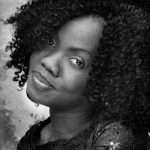
- Millen Magese on Endometriosis: Women Need Not Suffer in Silence - July 9, 2014
- Yemisi Ilo Sets The Record Straight On Her Battle With Multiple Sclerosis - July 23, 2014
- Endometriosis: More Than A Silent Inconvenience For Nike Oshinowo And Millions Of Women - September 30, 2014
- Yemisi Ilo Sets The Record Straight On Her Battle With Multiple Sclerosis [Part 2] - July 23, 2014





